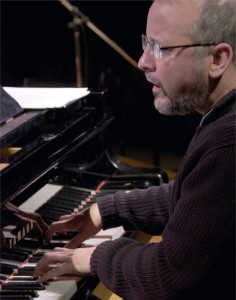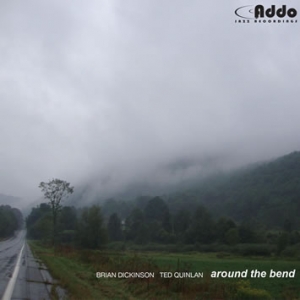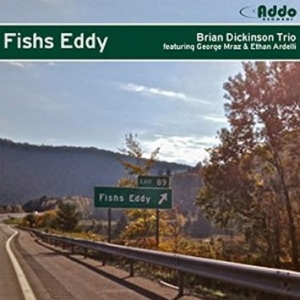Dickinson hopes to celebrate his “mid-life crisis” record with a Juno

Brian Dickinson was about 12-years-old, working as an usher at the Stratford Theatre Festival, when he first saw Oscar Peterson play the piano. Although Dickinson was born in Guelph, his family moved to Stratford when he was four and as a youth he worked at the campus theatre where there was always a top-flight summer jazz schedule. He got to hear many of the best players from the golden age of jazz: Ella Fitzgerald, Sarah Vaughan, Benny Carter, Gary Burton and the pianists he particularly admired, Keith Jarrett, Chick Corea and Montreal-born Peterson. “The first time I saw him and realized how good he was, it was incredibly disappointing,” the Port Credit resident of almost four years said in an interview this week. “I thought, ‘well, I should just pack it in. But then I started practicing like crazy. “The second time I saw him and realized again just how good he was, it was inspiring.” The anecdote about Peterson, who lived in Mississauga for the last 35 years of his life, has eerie parallels to the piano giant’s own personal encounter with the ghost of jazz genius past from his own youth. The self-described “snotty-nosed teenager” with his own radio program at 15 got a lesson in humility from his father Daniel who figured out a way to provide a governor for the prodigy’s rapidly expanding ego. He brought home a record of Art Tatum playing Tiger Rag and played to for his son. Oscar thought he’d figured out the joke and told his father that he knew what was going on – there were two pianos being played at the same time by different people. “He seemed to take a lot of pleasure informing me that this was one man and blind at that,” Peterson recalled in his autobiography A Jazz Odyssey. “I sank into a morass of dejection and would not go near a piano for a month.” Exposure to musical greatness in youth – as daunting and soul-scaring as it feels at the time – can provide a resolve to strive for excellence that can drive the wilful (and skilful) musician a very long way. In Dickinson’s case, it has spurred him on to a fine career as a leader, accompanist and teacher, a career that not that many people know about because it has been carved out in the jazz stream— a tributary of the musical world seemingly governed by the law of diminishing returns. In mid-March, Dickinson will have a chance to win his third Juno award at ceremonies being held this year in Hamilton. He’s won two previous Junos for best jazz album, one with Mike Murley in 1990 for Both Sides and one the next year for Brian Dickinson in Transition. He was also nominated in 2012 for an album featuring Boston-born Jerry Bergonzi on sax called other Places. This year he’s nominated in the new category of Best Album-Group for his trio recording with young Toronto drummer Ethan Ardelli and the masterful bassist George Mraz whose impact on jazz was felt from the moment he emigrated from Czechoslovakia to the U.S. in 1968 and began playing with Dizzy Gillespie. He was in Oscar Peterson’s trio for three years after Sam Jones left in 1970 because he could no longer travel. A CBC radio interview of Peterson by Bob Smith at the time he joined the trio finds Peterson accurately predicting that “he’s going to one of the great voices in jazz on the bass.” Mraz and Dickinson are two of a group of fly-fishing buddies who love to ply their hobby in the Catskills in upper New York State. The Juno-nominated title song Fishs Eddy, references a hamlet along the Delaware River. “It’s a lot quieter than my last one,” says Dickinson of the contemplative album, which features six originals and two standards. “This is my mid-life crisis record,” jokes the 53-year-old. It was recorded “stupidly fast” on the jazz-friendly Addo label in just four-and-a-half hours with the first four songs all being one-take wonders, done in a total 45 minutes. Part of the reason for that is the magic of Mraz, says the Port Credit resident. “I think he’s the best bass player for a pianist. He has unbelievable ears and his intuition is perfect because he knows when to follow, when to jump in with you and when to support you from behind.” Dickinson has been teaching in the jazz program at Humber College, where he also was a student, for 30 years. He heads the piano department and has helped nurture several generation of players, some of whom he will be “competing” against in the Juno category. The pianist seems to specialize in duos, probably because of his collaborative sensitivity. He’s recorded duet albums with Lee Konitz, Ted Quinlan and, most famously, the great ex-pat Canadian trumpeter Kenny Wheeler, who died last Sept.14. Dickinson learned about the project in an interesting way. He had played with Wheeler at the Toronto jazz festival and subsequently toured with him in Ontario and upstate New York. Wheeler was giving an interview to Cadence magazine in the U.S. when he was asked what his next project would be. “Brian and I are recording a duo record,” he replied, much to the shock and delight of his pianist. Dickinson and his frequent bassist Jim Vivian flew to Britain for Wheeler’s funeral. Dickinson organized a tribute concert to Wheeler at Humber in November. So what’s the best way for a jazz musician to resolve a mid-life crisis? How about reviving that much beloved, fiscally irresponsible but totally irresistible concept known as the jazz big band? Dickinson is tempting the fates, considering taking a sabbatical and damning the torpedoes by putting together an 18-piece big band he plans to tour and record. Many of the masters may be gone, but the jazz odyssey carries on.
NOTES:
• The tentative name for Dickinson’s big band is The Rhythm Method.
• Over 30 years of performing, he’s worked closely with numerous musicians, but is perhaps been most closely associated with Pat LaBarbera, with whom he has frequently played and has made two albums. He’s put out 10 albums under his own name and estimates he’s been a sideman on another 60 or so.
• Dickinson played piano on four CDs by Kieran Overs, who also lives in Port Credit. He was also prominent on the recent release by local vocalist Carol McCartney. Dickinson did several arrangements and played piano and provided the “contemporary vibe” McCartney was seeking for the record. Dickinson says McCartney was easy to work with. It was almost all recorded straight off the floor, with no overdubs. “If she did two takes, they both sounded fantastic,” he says.
• The pianist got a surprise not long ago when he arrived for a Mike Malone Jazz Orchestra session to rehearse on a tribute piece to Kenny Wheeler that was being done in three movements. The normal guitarist, Reg Schwager wasn’t available so there was a substitute. It was Dickinson’s son Sam who studied, as his father did, at the New England Conservatory and is now pursuing his master’s degree at McGill University in Montreal. The younger Dickinson was part of the JazzFM Youth Band and was featured on the JazzFM.91 program Jazzology as a Humber College student.
• Asked why certain works get nominated for Junos while others don’t, Dickinson says, “there is a certain amount of randomness involved.” He served as a Juno judge several years ago and says each judge was send a huge stack of CDs to review. You picked your top 10 and then email discussions ensue to arrive at a winner.
• Fishs Eddy was selected sixth on the list of top 12 Canadian jazz albums of 2014 by well-respected Ottawa Citizen jazz critic Peter Hum.
• the entry on Dickinson in the Canadian jazz bible, former Globe and Mail critic Mark Miller’s The Miller Companion to Jazz in Canada refers to Dickinson’s “attractive mainstream style notable for the lightness and grace of his touch, the balance of his lines and the controlled sweep of his solos at length.”



